Audemars Piguet Millenary Star Wheel reviewed
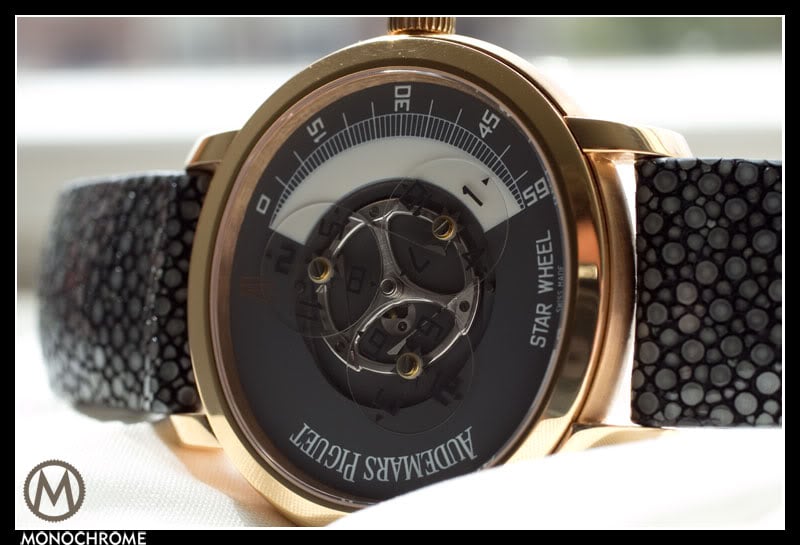
Monochrome had the chance to wear a very rare Audemars Piguet for two weeks. We bring you a review of the Audemars Piguet Millenary Star Wheel!
Recently a good friend said he was going to sell his Audemars Piguet Millenary Star Wheel. This is one of those watches we always enjoy seeing at collector’s dinners and other watchgeek meetings. However this one is so rare that chances you come across one are very rare. So we had to jump to the occasion…

We would like to thank the owner for letting us wear, photograph and review this magnificent timepiece. We believe the Audemars Piguet Star Wheel models to be landmark pieces in watchmaking history and we always wondered how much inspiration Felix Baumgartner and Martin Frei, from URWERK, found in the Audemars Piguet Star Wheel.
This particular version was released by Audemars Piguet in 2000 for their 125th anniversary. It was a limited edition of 50 pieces in yellow gold, 75 pieces in rose gold and 125 pieces in steel. The Star Wheel complication wasn’t new to the Audemars Piguet collection, as they already released a Star Wheel in 1991. For the 125th anniversary, Audemars Piguet also released a pocket watch featuring a star wheel complication to display the month and date. Audemars Piguet also created a Star Wheel with minute repeater. Now back to the Millenary Star Wheel…
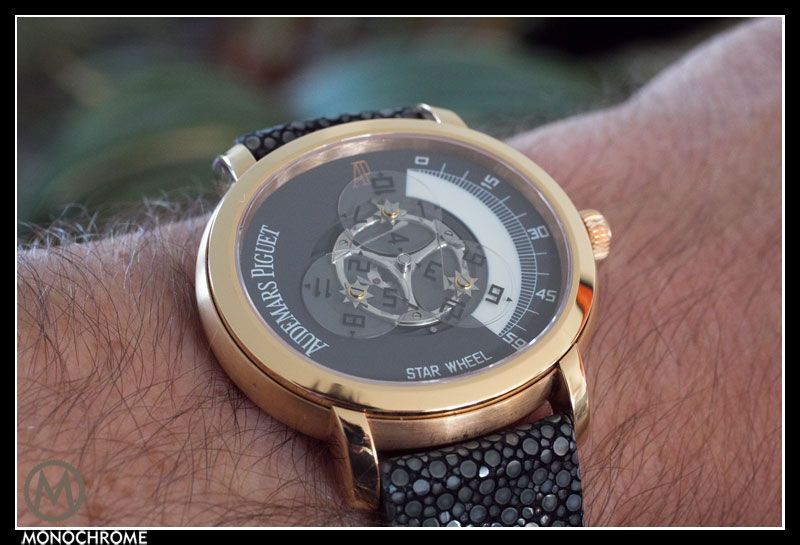
Overall appearance
The overall appearance of this watch is simply incredibly elegant. This is just the first impression and at second glance you see the star wheel complication. Although it’s right in the middle of the dial, it doesn’t draw too much attention. It’s intriguing and you immediately start wondering how this works. When a watch like this is on the wrist, the time is not the first thing we look for. When looking for the time, one might need a little time to get used to the (digital) way the time is displayed.
The Millenary case has a beautiful oval shape that has been designed with much attention for detail. This is also the case for the dial, the complication and… well actually everything of this watch has been well thought through. The more you look, the more details you notice that are just perfect, down to the hefty rose gold tang buckle.
The typical dial layout does have its advantages as well. When only a small part of the dial is peeking from under your jacket or shirt’s sleeve, it’s easy to read the time.
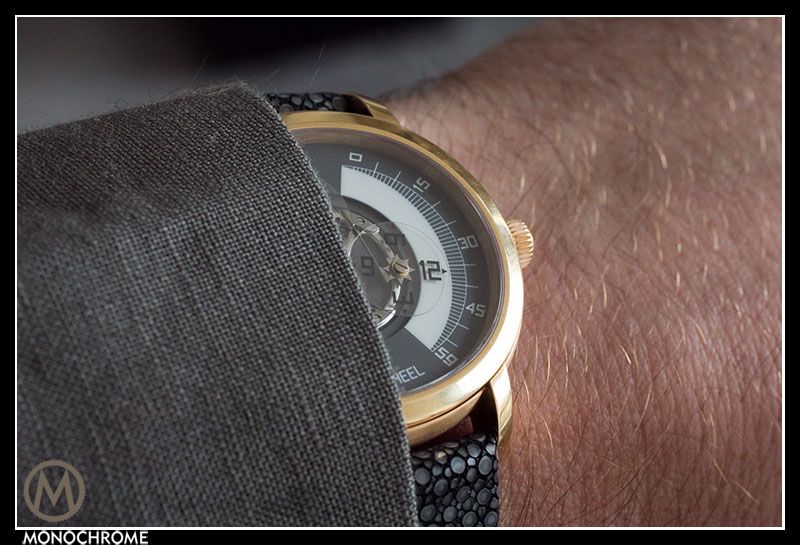
Let’s take a closer look…
Features
The features of the Millenary Star Wheel look simple, however they are quite complicated. It tells the time in an entirely different way than most mechanical timepieces, who make use of the typical hour and minute hands. The Millenary Star Wheel uses a so-called star wheel complication and displays the time digitally; the hours, visible in a 120-degree white scale/arc, point to the current minute that is to the right of the hour. The hours are printed on three sapphire disks, which are mounted on star shaped wheels (hence the name of the watch) and these are attached to a rotating center wheel. This entire assembly turns and the current hour is always displayed above the fore mentioned 120-degree white scale, with the minutes to the right of it.
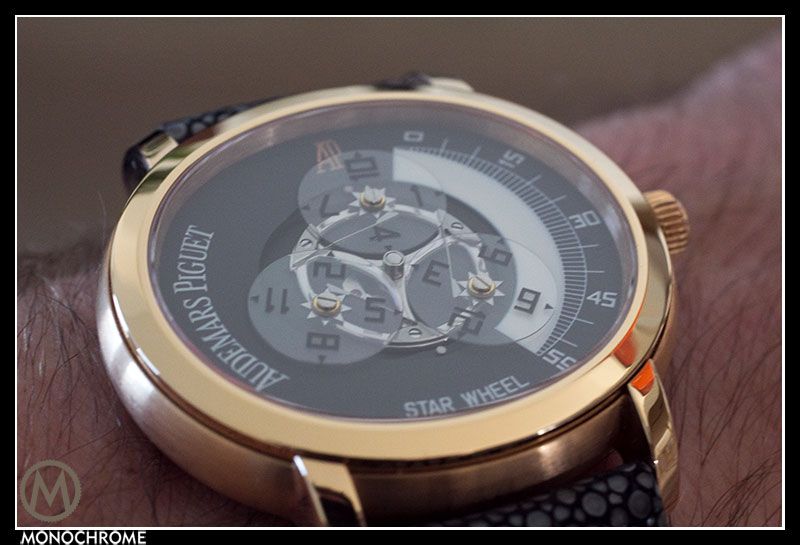
The star wheel complication was first released in 1991 in a round watch with a diameter of 36 mm. The time display was positioned on the topside of the dial, where the time display of the Millenary Star Wheel has moved to the right side of the dial.
Attached on the center staff, where usually the hour and minute hands are attached, is a rotating center ring on which the star wheels are attached. The sapphire disks with hour printed on them, are attached on the star wheels. The rotating ring turn 360 degrees, one full turn, in 3 hours. The minutes are displayed besides a 120 degree arc, so when an hour passes along that 120 arc, it takes exactly 1 hour for the hour indicator to start at the 1st minute and end at the 59th minute. Here you can see the hour pointing to the 57th minute and the next hour is already lining up, shortly before the 1st minute.
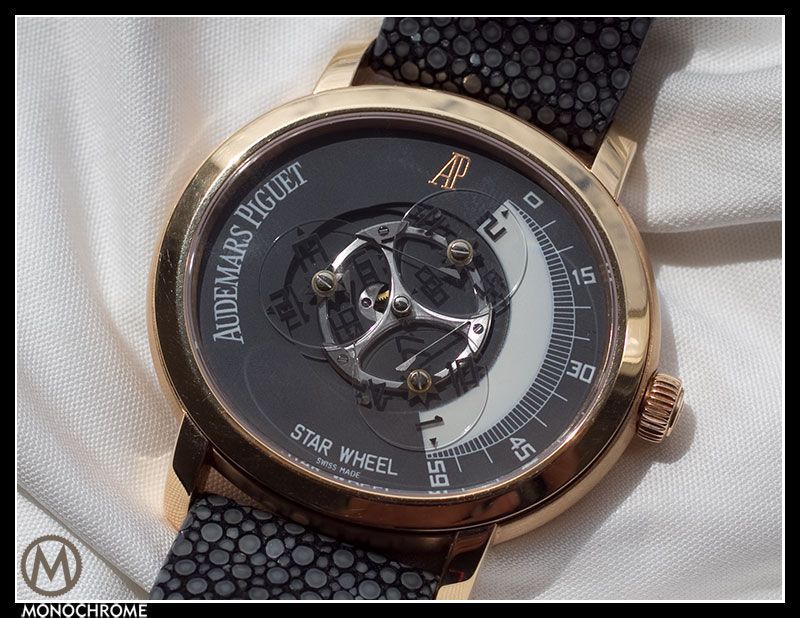
The movement of the hours along the minutes besides the 120 degree arc, is driven from the continuously rotating ring. When a sapphire disk is not over the 120 degree arc, the star wheel combined with other parts take care of positioning the correct next hour.
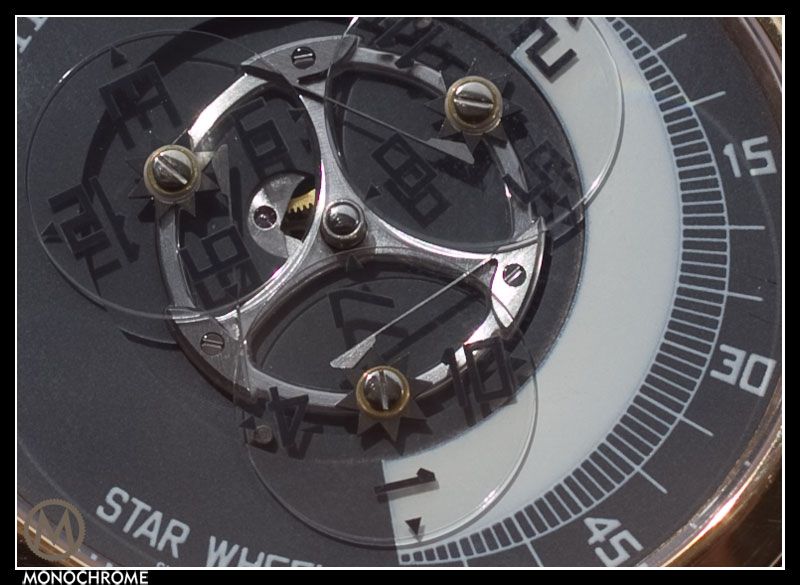
Watches with a jumping hour complication require quite some force once every hour, to let the hour jump. This is however no jumping hour construction, but the sapphire disks with hours do need two (small) rotations to position the correct hour before it reaches the 120 degree arc. Changing of a jumping hour, or even a date, a moon phase or a perpetual calendar will influence the watch’s rate in a negative way. While a date only changes once every 24 hours, the sapphire hour disks of the Star Wheel will make a small rotation 2 times every hour. This means 48 times per day! The forces caused by this, must be as minimal as possible to reduce negative forces on the watch’s rate.
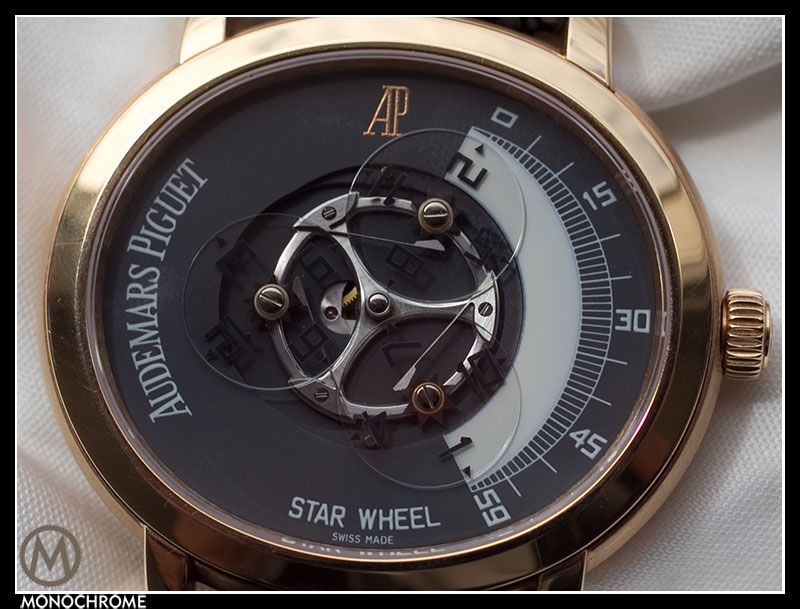
Dial/hands
The dial is light grey with a 120 degree white arc on the right side, with a minute scale. The name of the brand, Audemars Piguet, is printed on the right side of the dial, and the name of the watch, Star Wheel, is printed at the usual 6 o’clock position. At the 12 o’clock position we see the Audemars Piguet logo printed in gold matching the color of the rose gold case.
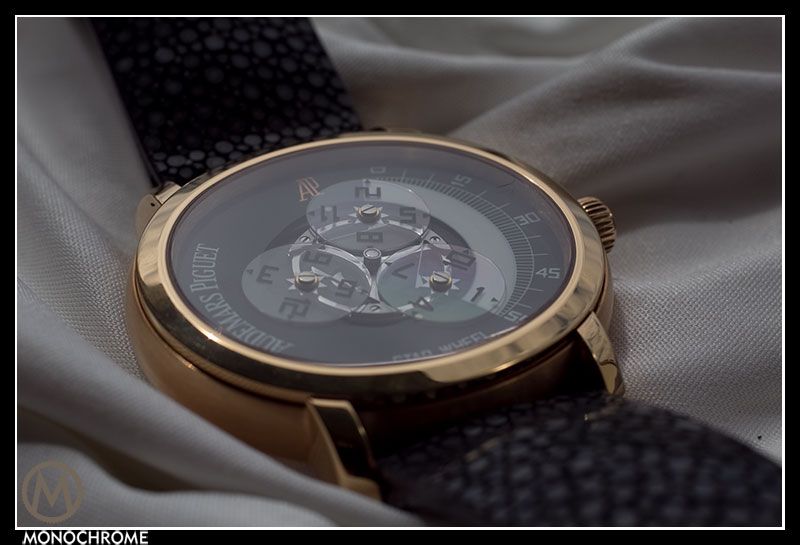
When you’re familiar with the watch, the construction of rotating wheel and the star wheels with attached sapphire hour disks are becoming a feast to look at. The parts of this complication are beautifully hand-finished with angling and polishing. Although the complication is positioned in the middle of the dial, it is done in an extremely elegant way and thus not something that draws too much attention nor is it visibly ‘loud’.
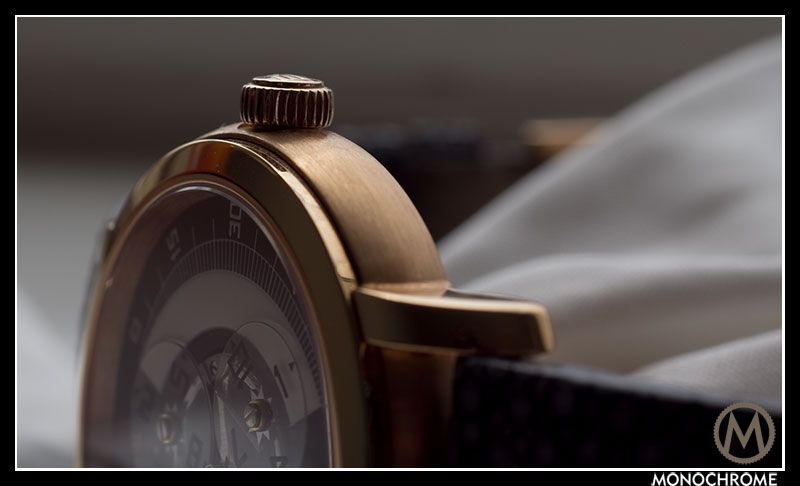
Case/strap
The oval case is brushed and has a polished bezel. Because the sides of the case are rounded, we can only assume the brush-finishing must be incredibly difficult and can only be done by hand.
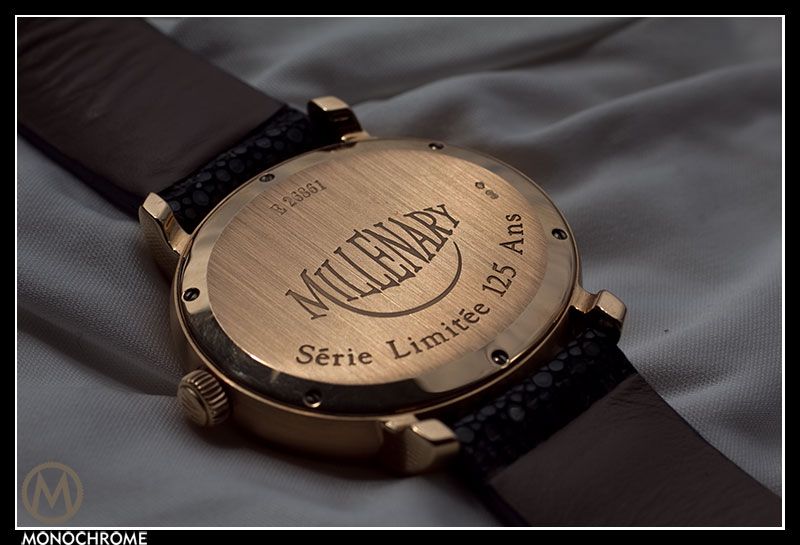
The screw down case back is closed with an brushed middle part and posilhed edges. On the brushed middle section of the case back we find engravings. In the middle of the case back is the word “Millenary” engraved and below that is “Série Limitee 125 And”, above it we find a serial number.
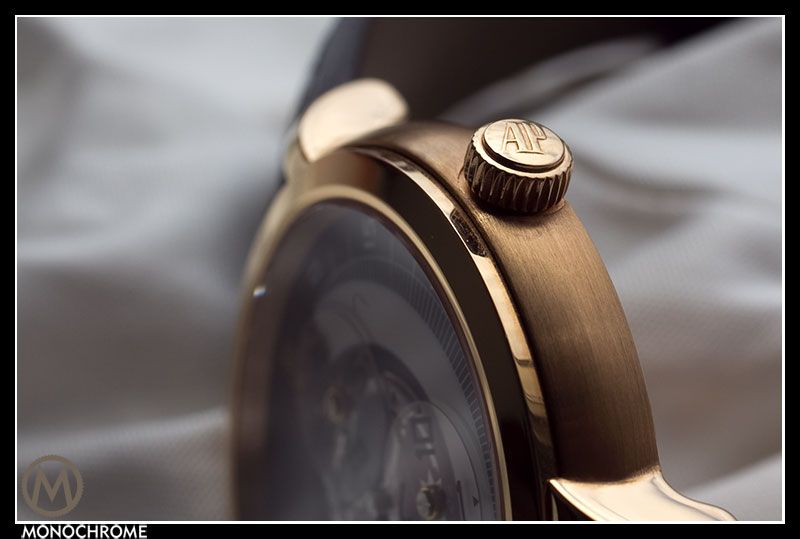
The crown shows an embossed AP logo and gives enough grip when winding the watch or adjusting the time. The lugs are entirely polished.
Originally the Millenary Star Wheel comes on a light grey calf leather strap, however the owner of this particular Star Wheel attached a stingray strap, custom made by ABP Paris. A splendid combination! The strap is closed by a relatively thick tang buckle.
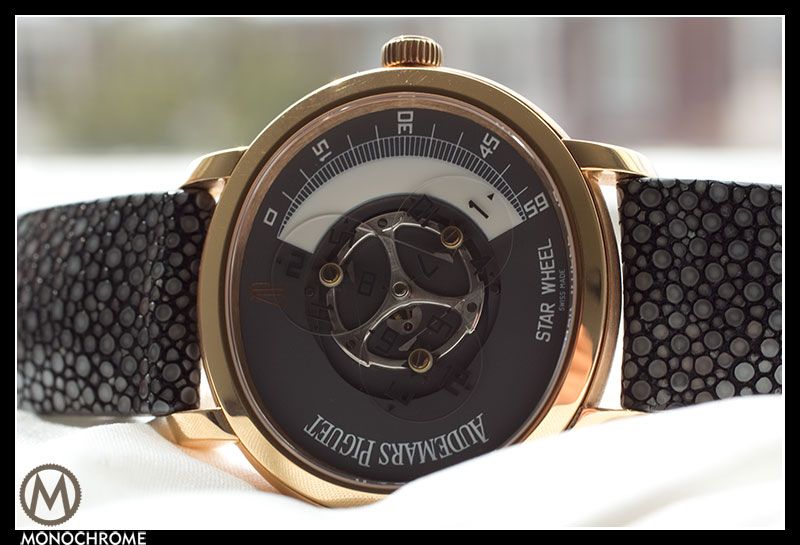
Movement
The movement Audemars Piguet used is caliber 2224/2811; caliber 2224 is the base caliber. This is an automatic movement, beating at 28,800 vibrations per hour (4Hz). The base movement has 35 jewels, we have however no information about the number of extra jewels used for the complication. The movement measures 26.00 mm (or 11.5 ligne) and is 4.85 mm thick; again no information on the additional thickness added because of the complication. The power reserve is 35 hours when fully wound.
The verdict – pros and cons
We simply love the Audemars Piguet Millenary Star Wheel. For its magnificent complication, for being a source of inspiration for others, for the gorgeous classy and sophisticated looks, for its comfortable wearing, for how easy it is to read the time, even when it just peeks from under your jacket or shirt’s sleeve… Visually it isn’t ‘loud’ and yet it’s a complicated watch. A watch with classic looks and a great story to talk about.
Unfortunately it’s time for us to say goodbye to the Millenary Star Wheel and return it to its owner, after one more photo…
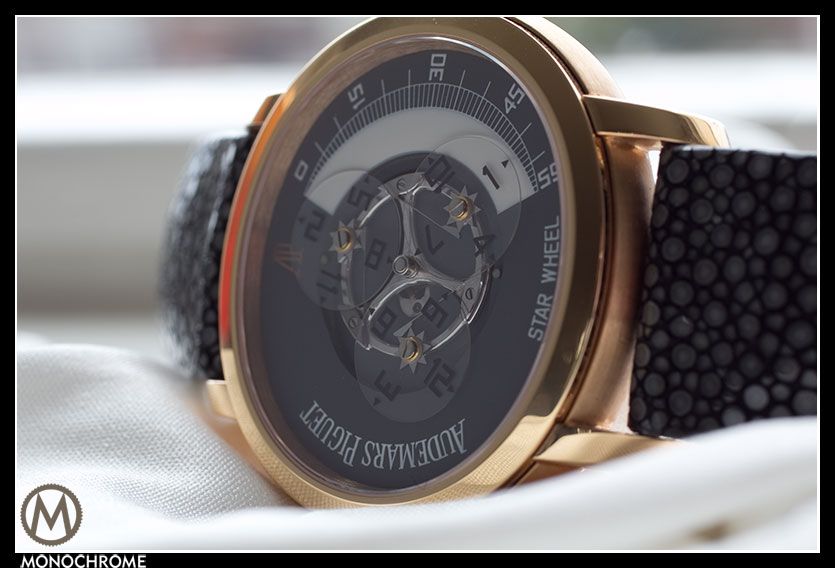
Edit: This Audemars Piguet Millenary Star Wheel is for sale at Watch-store.com; click on the A-B section to see it.




4 responses
Great piece, I’ve owned one of the early 90s pieces for a while. I wonder what caused conservative AP to do something so unusual.
Indeed a good question Greg. I also wondered about the Star Wheel models of AP. Somehow it doesn’t fit AP’s profile, at least not back than. Later, when they started coming with the concept models and started using new materials (carbon), it fits the profile better though.
Frank, could this be a wealthy man’s version of the Seiko Discus? Beautiful watch though worthy of AP!
Haha I hadn’t looked at it this way, but now you mention it 🙂